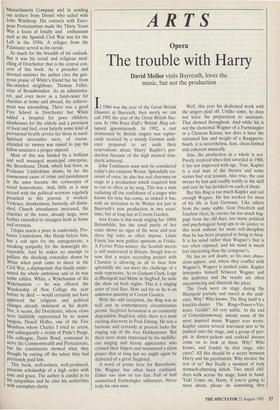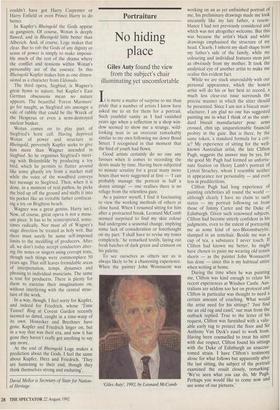ARTS
Opera
The trouble with Harry
David Mellor visits Bayreuth, loves the music, but not the production
If 1984 was the year of the Great British Disaster at Bayreuth, then surely we can call 1992 the year of the Great British Suc- cess. In 1984 Peter Hall's 'British' Ring col- lapsed ignominiously. In 1992, a cast dominated by British singers was raptur- ously received by a mainly German audi- ence prepared to set aside their reservations about 'Harry' Kupfer's pro- duction because of the high musical stan- dards achieved.
John Tomlinson must now be considered today's pre-eminent Wotan. Splendidly res- onant of voice, he also has real charisma on stage in a production which required him to run as often as he sang. This was a man radiating all the confidence of a singer who knows his time has come, as indeed it has, with an invitation to be Wotan not just in Bayreuth's new production in two years' time, but at long last at Covent Garden.
Ann Evans is this week singing her 100th Brannhilde, but the tonal purity of her voice shows no signs of the wear and tear these big roles so often impose. Linda Finnie has won golden opinions as Fricka. A Ferrier Prize-winner, the Scottish mezzo is still underrated in Britain, though less so now that a major recording project with Chandos is allowing us all to hear how splendidly she can meet the challenge of a wide repertoire. As to Graham Clark, Loge in Rheingold and Mime in Siegfried, he stole the show on both nights. This is a singing actor of real flair. How sad for us he is an unknown quantity at Covent Garden.
With the odd exception, the Ring was as well cast as contemporary circumstances permit. Siegfried Jerusalem is an eminently dependable Siegfried, while there is a most exciting discovery in Poul Elming. He was a baritone and certainly at present lacks the ringing top of the true Heldentenor. But there were many impressed by his melliflu- ous singing and heroic appearance who crossed their fingers and murmured a silent prayer that at long last we might again be delivered of a great Siegfried.
A word of praise here for Barenboim. His Wagner has often been confused. Either too slow or too fast. Full of half assimilated Furtwangler influences. Never truly his own man. Well, this year his dedicated work with the singers paid off. Unlike some, he does not leave the preparation to assistants. That showed throughout. And while his is not the elemental Wagner of a Furtwangler or a Clemens Krauss, nor does it have the sustained line and weight of a Knapperts- busch, it is nevertheless, lean, clean-limbed and coherent musically.
Alas, the production as a whole is not. Poorly received when first unveiled in 1988, it has not improved with age. True, Kupfer is a real man of the theatre and some scenes had real tension. Also true, the cast swears by him and readily testify to the skill and care he has lavished on each of them.
But this Ring is too much Kupfer and not enough Wagner. He has worked for most of his life in East Germany. Like others from the same stable, Gotz Friedrich and Joachim Herz, he carries far too much bag- gage from the old days, too many political and psychological hang-ups to do justice to this work without far more self-discipline than he has been prepared to bring to bear. It is his mind rather than Wagner's that is too often exposed, and his mind is much less interesting than the composer's.
He has no self doubt, so his own obses- sions appear, and, where they conflict with Wagner's, Wagner is pushed aside. Kupfer interposes himself between Wagner and the audience and the results are often unconvincing and diminish the piece.
The Gods were on stage during the Rheingold prelude and stared at the audi- ence. Why? Who knows. The Ring itself is a knuckle-duster. The Ring=Power=Vio- lence. Geddit? All very subtle. At the end of GOtterdlimmetung, amidst some of the most inspired music Wagner ever wrote, Kupfer causes several television sets to be pushed onto the stage, and a group of peo- ple in dinner-jackets and cocktail dresses come on to look at them. Why? Who knows, and frankly by that stage, who cares? All this should be a secret between Harry and his psychiatrist. Why involve the rest of us? But finally a moment of truly stomach-churning kitsch. Two small chil- dren walk across the stage, hand in hand. Yuk! Come on, Harry, if you're going to mess about, please do something they
couldn't have got Harry Carpenter or Harry Enfield or even Prince Harry to do better.
In Kupfer's Rheingold the Gods appear as gangsters. Of course, Wotan is deeply flawed, and in Rheingold little better than Alberich. And, of course, Loge makes that clear. But to rob the Gods of any dignity or sense of power is simply to make impossi- ble much of the rest of the drama where the conflict and tensions within Wotan's personality are of the essence. In this Rheingold Kupfer makes him as one dimen- sional as a character from Eldorado.
The third opera, Siegfried, is Wagner's great hymn to nature, but Kupfer's East German obsessions mean no nature appears. The beautiful 'Forest Murmurs' go for naught, as Siegfried sits amongst a vale of rubble that could be the Wreck of the Hesperus or even a semi-destroyed nuclear bunker.
Wotan comes on to play part of Siegfried's horn call. Having deprived Wotan of power and structure in Rheingold, perversely Kupfer seeks to give him more than Wagner intended in Siegfried. So he organises Siegfried's meet- ing with Briinnhilde by producing a toy bird, which he permits to flutter around like some ghastly toy from a market stall while the voice of the woodbird conveys her message to Siegfried. Then, when it is done, in a moment of real pathos, he picks the bird up off the ground and stuffs it into his pocket like an irritable father confiscat- ing a toy on Brighton beach.
Wagner was a great genius. Harry isn't. Now, of course, great opera is not a muse- um piece. It has to be reinterpreted, some- times radically. Nor must all of Wagner's stage direction be treated as holy writ. But there must surely be some self-imposed limits to the meddling of producers. After all, we don't today accept conductors alter- ing the notes or singers using corrupt texts, though such things were commonplace 50 years ago. That still leaves formidable areas of interpretation, tempi, dynamics and phrasing to individual musicians. The same is true for producers. There is plenty for them to exercise their imaginations on, without interfering with the central struc- ture of the work.
In a way, though, I feel sorry for Kupfer, and indeed for Friedrich, whose 'Time Tunnel' Ring at Covent Garden recently seemed so dated, caught in a time-warp of its own. Honecker and Brezhnev have gone. Kupfer and Friedrich linger on, but in a way that was their era, and now it has gone they haven't really got anything to say any more.
At the end of Rheingold Loge makes a prediction about the Gods. I feel the same about Kupfer, Herz and Friedrich. 'They are hastening to their end, though they think themselves strong and enduring'.
David Mellor is Secretary of State for Nation- al Heritage.











































 Previous page
Previous page